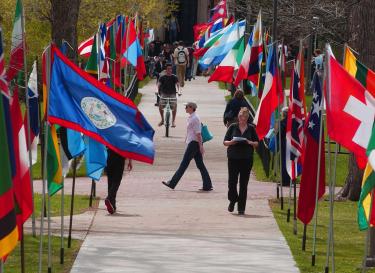Teaching International Students (TIS)
We are not offering this program in Spring 2025. Please sign up for the CTL Newsletter to receive updates about future application openings.

The Teaching International Students (TIS) micro-credential is a professional development program designed to support multilingual international students both inside and outside the classroom. This program is tailored for instructors at all levels and instructional support staff who want to create inclusive and effective learning environments. The course emphasizes high-impact course design and instructional strategies that leverage the linguistic and cultural strengths international students bring to U.S. classrooms.
Program Format and Timeline
The TIS program spans one academic semester and follows a hybrid format that includes asynchronous coursework via Canvas and synchronous group meetings. Participants can complete the program while managing other academic and professional responsibilities.
The Fall 2024 cohort will run from September 9, 2024, to December 12, 2024. Group meeting times will be determined based on participant availability. Applications received by August 2, 2024, will receive priority consideration, but applications will be accepted until August 23, 2024, or until all spots are filled. For questions or accessibility accommodations, contact karen.crouch@colorado.edu.
Program Requirements
Participants are expected to complete all Canvas coursework, attend scheduled group meetings, and submit a final Capstone Project. Successful completion of these components will earn participants a digital micro-credential badge issued through CU Boulder's micro-credential program.
Learning Outcomes
By completing the TIS micro-credential, participants will:
- Analyze Emerging Trends - Develop an understanding of the evolving experiences of international students at U.S. colleges and universities.
- Implement Best Practices - Learn effective strategies to create inclusive learning environments and promote the academic success of international students.
- Commit to Action - Make personal commitments to improving the educational experiences and outcomes for international students.
Eligibility
The TIS program is open to instructors at all levels, including lecturers, teaching professors, and graduate teaching assistants, as well as CU Boulder staff who support instruction.
Graduate students working toward the Certificate in College Teaching or the Future Faculty Development Certificate can earn 5 CTL credits upon completing the program.
Application Process
We encourage interested participants to submit their applications as early as possible to secure a spot in the program. Applications submitted by August 2, 2024, will receive priority consideration, but we will continue accepting applications until August 23, 2024, or until capacity is reached.
For questions, concerns, or accessibility needs, contact karen.crouch@colorado.edu.
To complete the TIS program, participants are expected to complete Canvas coursework, attend group meetings, and complete a final Capstone Project. Participants who complete the Teaching International Students program will earn a digital micro-credential badge issued via CU Boulder's micro-credential program.
After completing this micro-credential, participants will be able to:
- Discuss emerging trends in the experiences of international students attending U.S. colleges and universities.
- Explore best practices for creating inclusive learning environments and promoting international students' academic success.
- Make personal commitments to improving the academic experiences of international students.
Who can apply: Instructors across all levels (e.g., lecturers, teaching professors, graduate teaching assistants*, etc.), and staff at CU Boulder.
If you are a graduate student working towards the Certificate in College Teaching or the Future Faculty Development Certificate, TIS micro-credential badge will account for 5 CTL credits.
Reading Materials: Shapiro et al. 2023. Fostering International Student Success in Higher Education & other companion resources provided free of cost to all participants.
International students constitute a large portion of students currently enrolled in U.S. higher education. CU Boulder alone hosted 2123 international students in the spring of 2021. This micro-credential provides professors, graduate students, and teaching staff with knowledge and skills to offer international students an equitable academic experience. By publicly displaying the digital badge awarded upon successful completion of this program, faculty, graduate students, and teaching faculty will communicate their qualifications to support international student learning, which also signals the intent to promote an inclusive environment. The micro-credential program is grounded on concepts of inclusive pedagogy, universal design for learning, and intercultural competence as these apply to the international student experience. These content areas have been the focus of several initiatives across campus, which allows participants in this program to take advantage of resources already available to our campus community. This program aligns with one of the campus diversity and inclusion plan's (the IDEA Plan) action areas, which aims to "cultivate success for a diverse undergraduate and graduate student body with new financial resources and programming" (p. 9). Departments/primary units will be able to effectively measure international-student-focused professional development.
The TIS micro-credential was initially conceived as the Working with International Students micro-credential by Roberto Arruda, former Director of International Student Academic Success at the Office of Undergraduate Education.
In 2023, this micro-credential came under the ambit of the Center for Teaching & Learning and was completely re-designed and re-launched as the Teaching International Students Micro-credential in Spring 2024. The TIS micro-credential program was designed by a collaborative team of the following individuals and offices:
- Rachana Bhave, Equitable Assessment Specialist, Center for Teaching & Learning (CTL)
- Karen Crouch, Instructional Design & Technology Consultant, Arts & Sciences Support of Education through Technology (ASSETT)
- Quatez Scott, Inclusive Pedagogy Lead, Center for Teaching & Learning (now Assistant Director, Inclusion, Diversity and Equity in Agriculture, CSU)
- Rai(chle) Farrelly, TESOL Director, Department of Linguistics
- Paige Progar, Senior Assistant Director, International Student and Scholar Services
- Ruth Moore, Director, International English Center
- Andrew Wingfield, Director, Global Engagement, College of Engineering and Applied Sciences (now Director, Office of Global Education at University of Colorado Denver)

